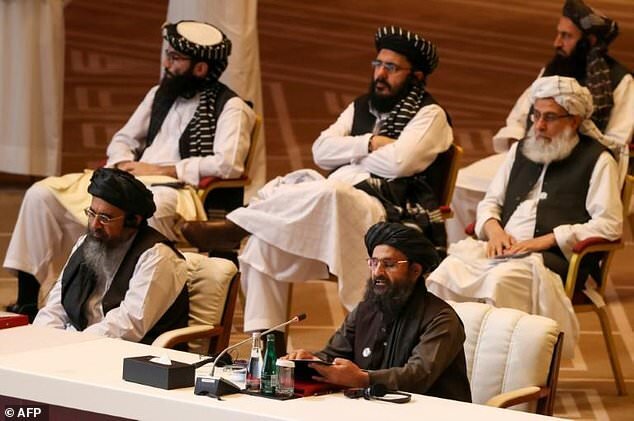Pirmohammad Mollazehi told the Strategic Council on Foreign Relations that the most important problem of any peace plan for Afghanistan is that the Taliban is seeking to establish an Islamic state while the people and government of Afghanistan as well as political and religious parties want to keep the Islamic Republic establishment.
“At the present time, there are two main plans: one is the Moscow plan and the other is the American plan. There are similarities between the two plans in some issues and it seems that there is preliminary coordination between Moscow and Washington in this connection.”
He added that both plans consider important roles for regional and global players, saying that “the United Nations has defined important roles for the neighboring and influential countries as well as big regional and international powers.”
Mollazehi said the interim government is going to consider ceasefire and reform the current constitution or draft a new one to accommodate the approaches of both parties on establishing an Islamic state and an Islamic republic.
He added that in this plan, the government posts will be divided equally between the Taliban and domestic currents (Abdullah Abdullah and Ashraf Ghani) and the Taliban will be shared in the power in the first stage.
Referring to the main three currents influencing developments in Afghanistan, he said “the domestic current is divided into three groups: the Taliban plus Hekmatyar who include Islamist parties; second are the Jihadi groups represented by Abdullah Abdullah and third are the Liberals led by Ashraf Ghani.”
Mollazehi said the second influential current is the regional countries that have common borders with Afghanistan and those countries that exert influence in that country but do not have common borders with Afghanistan.
“The first group is three Central Asian states including Tajikistan, Uzbakistan and Turkmenistan plus Iran and Pakistan. The second group includes countries such as India, Saudi Arabia, the UAE, Qatar and Turkey with no borders with Afghanistan.”
The third group, he said, are the countries that compete over influence in Afghanistan. They include big powers such as Russia, the United States, the European Union and China.
Mollazehi added that Moscow and Washington believe that there should be coordination among these three currents so that peace could be established in Afghanistan and they guarantee the peace for Afghanistan, region and the whole world.
The expert of sub-continental issues said such a plan to establish peace in Afghanistan is facing problems, adding that “the main problem with the plan is the main competition between an Islamic state and an Islamic republic. In fact, the Taliban is seeking to establish an Islamic state while the people and government of Afghanistan as well as political and religious parties want to keep the Islamic Republic establishment.”
“For this plan to succeed, the Taliban in principle should moderate their positions and accept democratic mechanisms and transfer of power through elections, the rights of the Shia minority and the rights of the women as enshrined in the new Constitution and the freedom of the press. Here the Taliban wants the government to accept Islamic rules and tenets. Americans have predicted that for the settlement of this issue, it is better to form a council of Faqihs or Ulema. This council of Ulema would in fact play the role of the Council of Guardian in Iran which is tasked with making the laws compatible with the Sharia. Half of the members of this council shall be appointed by the government and the other half by the Taliban.”
According to Mollazehi, in the US plan, there is going to be a National Consultative Assembly and a Senate House. The frameworks for such assemblies are yet to be defined. However, the problem is: will the members of these assemblies be appointed or elected by the vote of the people as the structure of power would change.
He added that in this case, the structure created by the Bonne Conference which centralized the power in Kabul would change.
Mollazehi added that the establishment of Afghanistan may move towards federalism and parliamentarism.
“The Taliban will not easily accept this because they believe that issues should be resolved through Islamic allegiance and Sharia rather than parliament. Their view is that there is a ruler in the Islamic state and others need to pay allegiance to the ruler. Here comes the main issue: will the Taliban accept this or the government would drop its efforts to set up a democratic mechanism and transfer of power through elections? ”
Mollazehi said such issues should be resolved in both the Moscow and Washington plans so that a ceasefire is established and the structure of power is determined.
Asked about the upcoming meeting in Moscow, he said regional countries, international players and domestic groups in Afghanistan have been invited to the Moscow conference to examine a peace plan.










0 Comments